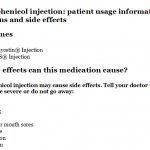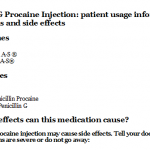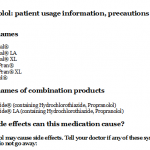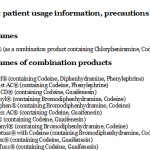
Fluphenazine: patient usage information, precautions and side effects
Tuesday, May 30, 2017 by Gregory Van Dyke
http://www.naturalnewsreference.com/2017-05-30-fluphenazine-patient-usage-information-precautions-and-side-effects.html
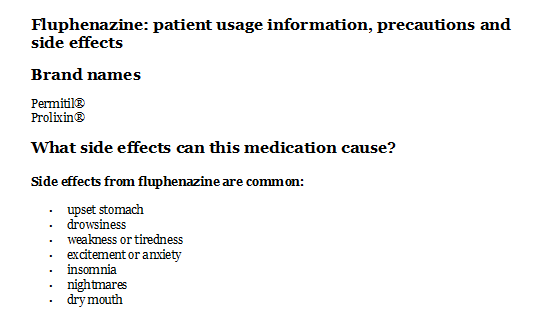
Fluphenazine: patient usage information, precautions and side effects
Brand names
Permitil®
Prolixin®
What side effects can this medication cause?
Side effects from fluphenazine are common:
- upset stomach
- drowsiness
- weakness or tiredness
- excitement or anxiety
- insomnia
- nightmares
- dry mouth
- skin more sensitive to sunlight than usual
- changes in appetite or weight
Tell your doctor if any of these symptoms are severe or do not go away:
- constipation
- difficulty urinating
- frequent urination
- blurred vision
- changes in sex drive or ability
- excessive sweating
- If you experience any of the following symptoms, call your doctor immediately:
- jaw, neck, and back muscle spasms
- slow or difficult speech
- shuffling walk
- persistent fine tremor or inability to sit still
- fever, chills, sore throat, or flu-like symptoms
- difficulty breathing or swallowing
- severe skin rash
- yellowing of the skin or eyes
- irregular heartbeat
If you experience a serious side effect, you or your doctor may send a report to the Food and Drug Administration’s (FDA) MedWatch Adverse Event Reporting program online (http://www.fda.gov/Safety/MedWatch) or by phone (1-800-332-1088).
IMPORTANT WARNING:
Studies have shown that older adults with dementia (a brain disorder that affects the ability to remember, think clearly, communicate, and perform daily activities and that may cause changes in mood and personality) who take antipsychotics (medications for mental illness) such as fluphenazine have an increased risk of death during treatment.
Fluphenazine is not approved by the Food and Drug Administration (FDA) for the treatment of behavior problems in older adults with dementia. Talk to the doctor who prescribed this medication if you, a family member, or someone you care for has dementia and is taking fluphenazine. For more information visit the FDA website: http://www.fda.gov/Drugs
Why is this medication prescribed?
Fluphenazine is an antipsychotic medication used to treat schizophrenia and psychotic symptoms such as hallucinations, delusions, and hostility.
This medication is sometimes prescribed for other uses; ask your doctor or pharmacist for more information.
How should this medicine be used?
Fluphenazine comes as a tablet or oral liquid (elixir and concentrate) to take by mouth. It is usually taken two or three times a day and may be taken with or without food. Follow the directions on your prescription label carefully, and ask your doctor or pharmacist to explain any part you do not understand. Take fluphenazine exactly as directed. Do not take more or less of it or take it more often than prescribed by your doctor.
Fluphenazine oral liquid comes with a specially marked dropper for measuring the dose. Ask your pharmacist to show you how to use the dropper. Do not allow the liquid to touch your skin or clothing; it can cause skin irritation. Dilute the concentrate in water, Seven-Up, carbonated orange beverage, milk, or V-8, pineapple, apricot, prune, orange, tomato, or grapefruit juice just before taking it. Do not use beverages containing caffeine (coffee, tea, and cola) or apple juice.
Continue to take fluphenazine even if you feel well. Do not stop taking fluphenazine without talking to your doctor, especially if you have taken large doses for a long time. Your doctor probably will want to decrease your dose gradually. This drug must be taken regularly for a few weeks before its full effect is felt.
What special precautions should I follow?
Before taking fluphenazine,
- tell your doctor and pharmacist if you are allergic to fluphenazine or any other drugs.
- tell your doctor and pharmacist what prescription and nonprescription drugs you are taking or have taken within the last 2 weeks, especially antidepressants; antihistamines; bromocriptine (Parlodel); diet pills; lithium (Eskalith, Lithobid); medication for high blood pressure, seizures, Parkinson’s disease, asthma, colds, or allergies; meperidine (Demerol); methyldopa (Aldomet); muscle relaxants; propranolol (Inderal); sedatives; sleeping pills; thyroid medications, tranquilizers; and vitamins.
- tell your doctor if you have or have ever had glaucoma, an enlarged prostate, difficulty urinating, seizures, an overactive thyroid gland, or liver, kidney, or heart disease.
- tell your doctor if you are pregnant, especially if you are in the last few months of your pregnancy, or if you plan to become pregnant or are breast-feeding. If you become pregnant while taking fluphenazine, call your doctor. Fluphenazine may cause problems in newborns following delivery if it is taken during the last months of pregnancy.
- if you are having surgery, including dental surgery, tell the doctor or dentist that you are taking fluphenazine.
- you should know that this drug may make you drowsy. Do not drive a car or operate machinery until you know how this drug affects you.
- remember that alcohol can add to the drowsiness caused by this drug.
- tell your doctor if you use tobacco products. Cigarette smoking may decrease the effectiveness of this drug.
What should I do if I forget a dose?
Take the missed dose as soon as you remember it. However, if it is almost time for the next dose, skip the missed dose and continue your regular dosing schedule. Do not take a double dose to make up for a missed one.
What should I know about storage and disposal of this medication?
Keep this medication in the container it came in, tightly closed, and out of reach of children. Store it at room temperature and away from excess heat and moisture (not in the bathroom). Throw away any medication that is outdated or no longer needed. Talk to your pharmacist about the proper disposal of your medication.
In case of emergency/overdose
In case of overdose, call your local poison control center at 1-800-222-1222. If the victim has collapsed or is not breathing, call local emergency services at 911.
What other information should I know?
Keep all appointments with your doctor and the laboratory. Your doctor will order certain lab tests to check your response to fluphenazine.
Do not let anyone else take your medication. Ask your pharmacist any questions you have about refilling your prescription.
It is important for you to keep a written list of all of the prescription and nonprescription (over-the-counter) medicines you are taking, as well as any products such as vitamins, minerals, or other dietary supplements. You should bring this list with you each time you visit a doctor or if you are admitted to a hospital. It is also important information to carry with you in case of emergencies.
Why is this medication prescribed?
How should this medicine be used?
What special precautions should I follow?
What should I do if I forget a dose?
What side effects can this medication cause?
What should I know about storage and disposal of this medication?
Tagged Under: Tags: chemical medicine, medication, Pharma, Prescription Medicine

